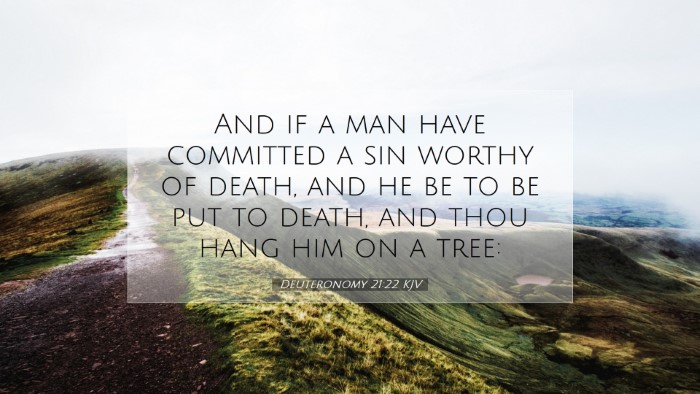Commentary on Deuteronomy 21:22
Bible Verse: Deuteronomy 21:22 (ESV): "And if a man has committed a crime punishable by death and he is put to death, and you hang him on a tree..."
Introduction
This verse is part of the broader legal and moral framework provided to the Israelites as they prepared to enter the Promised Land. The laws in Deuteronomy signify God's intentions for His people, focusing on the maintenance of justice, community integrity, and divine relationships. This commentary seeks to distill insights from respected public domain commentaries to extract profound theological and practical implications.
Context and Background
The context of Deuteronomy is vital for understanding the gravity of this verse. Deuteronomy is presented as a series of speeches by Moses, reiterating the Law to the new generation of Israelites. The verse appears in a section detailing various offenses and their corresponding punishments. Here, it reflects the seriousness with which the Israelites are expected to treat laws and justice.
Legal Implications
- Capital Punishment: The mention of a "crime punishable by death" indicates the seriousness of certain offenses within the covenant community. Commentators like Albert Barnes emphasize that this provision illustrates God's commitment to justice, maintaining order in society.
- The Hanging: The act of hanging on a tree signifies not only punishment but also a profound public display of that punishment as a warning to others. Adam Clarke notes that such practices were meant to highlight the severity of transgression and the need for societal adherence to divine law.
Theological Insights
The Just Nature of God
Matthew Henry observes that this section underscores the just nature of God, as expressed through the Law. The punishment serves as a reminder that sin carries weighty consequences and that God’s holiness requires accountability. It reflects a judicial system that desires restoration of order, pointing towards the necessity of justice in the life of the community.
Symbolism of the Tree
Moreover, the imagery of being hung on a tree has been interpreted by Christian theologians as foreshadowing the crucifixion of Christ. Clarke notes that Paul references this in Galatians 3:13, highlighting that Jesus became a curse for us, fulfilling the prophetic nature of this Law. Thus, this verse, while primarily securing justice in the Israelite context, transcends to anticipate the ultimate act of justice and mercy fulfilled in Christ.
Moral Implications
The broader moral implications of this Law are significant for both ancient Israel and contemporary Christian practice. The commentary by Barnes points out the value placed on human life and the community's responsibility to uphold God’s commandments. This cultivates an ethic that confronts wrongdoing while fostering repentance and restoration.
Community Responsibility
- Collective Ethics: The laws provided serve as a collective guide for the Israelites. They are to hold each other accountable, which presumes a level of communal vigilance that is often overlooked. This notion of community responsibility resonates in Church teachings today, calling believers to uphold moral and ethical standards.
- Prevention Over Punishment: The emphasis on punishment directs attention to the necessity of prevention and moral education within the community. As elucidated by Matthew Henry, the seriousness of such laws encourages vigilance against moral decay.
Practical Applications
The teachings drawn from this verse offer critical applications within various contexts of ministry and personal conduct:
- Justice in Leadership: Church leaders are reminded of their responsibilities to uphold justice in their congregations, ensuring that actions reflect God’s righteousness.
- Teachings on Sin and Consequences: Understanding the gravity of sin and its consequences can facilitate stronger teachings on repentance and grace.
- Community Integrity: Fostering strong community ethics through teachings and actions can prevent moral decay, akin to the warnings embedded in Israel’s legal framework.
Conclusion
Deuteronomy 21:22 serves as a powerful reminder of God's justice, the severity of sin, and the implications for community life. It becomes a poignant symbol of the biblical narrative, echoing throughout both the Old and New Testaments and culminating in the redemptive work of Christ. As pastors, students, theologians, and scholars reflect on this passage, may they find renewed dedication to justice, community ethics, and the understanding of grace that transcends the Law.


